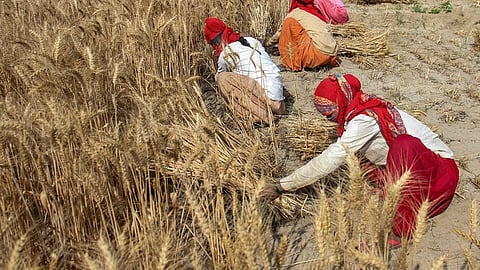India better prepared than Pakistan to handle climate shocks in wheat crop, say Agri-scientists
NEW DELHI: Conducive weather conditions in both India and Pakistan are helping them to achieve record wheat output this year, but India is better prepared than its neighbour to handle climate change impact as it has developed many indigenous heat-resistant and short-duration seed varieties, according to agri-scientists.
India is the second and Pakistan is the eighth largest wheat-producing country in the world. While India is self-sufficient in wheat output, the latter imports 2-3 million tonnes.
One of the reasons behind Pakistan still being dependent on imports to meet domestic requirements is its failure to develop indigenous varieties of climate-resilient seeds.
Presently, the harvesting of wheat crops is underway in both countries. India has projected wheat output to touch a new record of 114 million tonnes in the 2023-24 crop year (July-June), while Pakistan has set an ambitious target of 32.2 million tonnes from an area of 8.9 million hectares.
While the two countries have been facing the adverse impact of climate change on wheat crop since 2010 onwards, the current year has been exceptionally favourable as there have been no events of terminal heat waves nor unseasonal rains affecting the crop.
"Climate has been favourable this year. During the crucial period of mid-January and February, there were no incidents of sudden heat waves, unseasonal rains, and lodging. We are expecting a bumper crop," ICAR-Indian Institute of Wheat and Barley Research (ICAR-IIWBR) Director Gyanendra Singh told PTI.
He highlighted that climate-resilient wheat varieties have been sown in more than 80 per cent of the total wheat area of 34.15 million hectares this year because of the availability of newer seed varieties and also greater awareness among farmers.
Out of 600 indigenous wheat varieties released so far in India, Singh said as many as over 100 climate-resilient varieties are in the seed chain now. Around 14 new varieties were released in the current year itself.
According to Naresh Kumar, Principal Investigator at ICAR's National Innovations in Climate Resilient Agriculture (NICRA), India is doing much better when compared to other countries in taking various agronomic measures such as changing planting dates and short-duration varieties besides promoting raised bed cultivation, sprinkler irrigation, and soil-water-nitrogen management.
Wheat crop is highly sensitive to temperature increases. Hot and unseasonal warm weather cut India's wheat output in 2022 and 2023, leading to a drawdown in state reserves.
It is reported a 5.5 per cent decrease in wheat yield during the past 30 years (1980-2010) occurred due to a decadal temperature increase of 0.13 degree Celsius.
With further predicted rise in temperatures, many studies have reported a decline in wheat production in the world.
Rajbir Yadav, wheat breeder and Principal Scientist at Indian Agricultural Research Institute (IARI), said the climate-smart seed varieties that India has developed can be easily grown in Pakistan, Bangladesh and Nepal.
"It can fit well in some areas as agro-climatic conditions are the same," he said. The situation of wheat farmers in Pakistan is different despite sharing similar agro-climatic conditions for growing wheat.
Since 2021, Pakistan's agriculture department has released as many as 31 wheat varieties through international collaborations to help cultivated fields become more productive, climate-resilient and disease-resistant.
While Pakistan Agriculture Research Council (PARC) has acquired over 4,000 wheat germplasm varieties from various international sources for evaluation and utilization in national breeding programmes, it has yet to indigenously produce quality seeds and species with the ability to absorb climate shocks.
Ejaz Rao, a progressive farmer from Bahawalpur, said, "Pakistan's agriculture authorities have failed to improve seed quality for over 20 years. The hybrid seeds from countries with different climate present dual challenge i.e. non-compatible with local agro-climatic conditions and disease-carriers.
"During late 20th century, a hybrid seed from US carried a pest, locally named as "AmrikanSundi", which could not be eradicated," Rao said.
Stating that climate change has necessitated changes in sowing and harvesting seasons, he suggested adapting to new realities. "The availability of seeds, inputs, fertilizer and water must be ensured on time to ward off la niña and elniño effects."
Dr Zahir A Zahir, Professor of Institute of Soil & Environmental Sciences, University of Agriculture, Faisalabad, said the University in collaboration with Washington State has developed and acclimatized germplasm, a hybrid seed variety, which requires less water and gives more yield.
"Pakistan has turned from net exporter of wheat to net importer of wheat in a short period of just five years, thanks to the formidable twin challenge of climate change and population explosion affecting in tandem," says Mushtaq Ahmad Gill, Chief Executive, South Asian Conservation Agriculture Network (SACAN).
Highlighting the importance of water amidst raging global warming, Gill who is also former Director General of Water Management, Punjab, Pakistan said Pakistan sadly only has water storage capacity for 30 days.
"Half of the year, we face drought, the other half, floods," Gill said and called for increasing water storage and saving precious water worth billions of dollars from going into the sea every year.
"We, the agricultural scientists and farmers from India and Pakistan, regularly stay in touch with each other and hold online/Youtube sessions to benefit from each other's experiences. We exchange technology, expertise and products to help each other get optimum yields," Gill said, while stressing on the need to maintain regular contacts.
Punjab's Minister for Agriculture Syed Ashiq Hussain Shah ruled out any climate impact on wheat crop. "We are expecting a bumper crop this year."
(This cross border story was done by Laxmi Devi Aere, Assistant Editor of news agency PTI, New Delhi, and Amer Malik, an investigative journalist with the News International, Pakistan, as part of the US-based East West Centre's initiative on reporting issues on mutual concern.)

